You’ve probably heard (and not just once) about the issues both Facebook and Google are facing with regarding “the fake news”. But not only digging deeper into this matter and putting the fake news issue into the light of truth interests us. We need to approach this subject from our website’s point of view; what influence does the fake news matter exert on our website? Will I be penalized if I am linked from a fake news sites? Will Google deindex or penalize that website as well? These and many other questions related to fake news subjects are going to be tackled in the following lines.

Hope you’ve grabbed your cup of coffee, turned your fake detector on and, hoping you’ll take the time to browse through all our article, here are the article’s touch points:
- Downgrading Google News to Top Stories – How Did Google End Up in This Situation?
- Fake News Appearing in Google
- Labeling Fact-Check Articles in Google News
- Will Google Penalize Your Site If You Are Linked from a Fake News Site?
- Should I ask a Fake News site to delete my links from their site?
- Will Google Deindex/Penalize Fake News Sites?
- Will Google Show Only Vetted Sites in the News Category?
- Instead of Conclusion: Fake News versus Relative Truth
Downgrading Google News to Top Stories – How Did Google End Up in This Situation?
Forgery. Counterfeit. Copy. Sham. Fraud. Hoax. Imitation. Mock-up. Dummy/ Reproduction. Name it as you want, it will still mean the same and it will not change the fact that parts of history, politics, sports, economics, etc. have been at some point touched by fakery or were under the suspicion of forgery. Therefore, it’s almost impossible for the news category, which presents information on all major subjects, not to be affected by “fraud”.
Whose fault is it that we are getting our news feed bombed with fake news? The editors? The publications? Google for allowing them to rank highly? The readers for consuming that piece of content?
The truth is that the situation is far more complex that we might think and at this point throwing blames might not serve us much. At the end of the day, Google works based on algorithms that are trained and perfected by us, the users. Or isn’t it so?
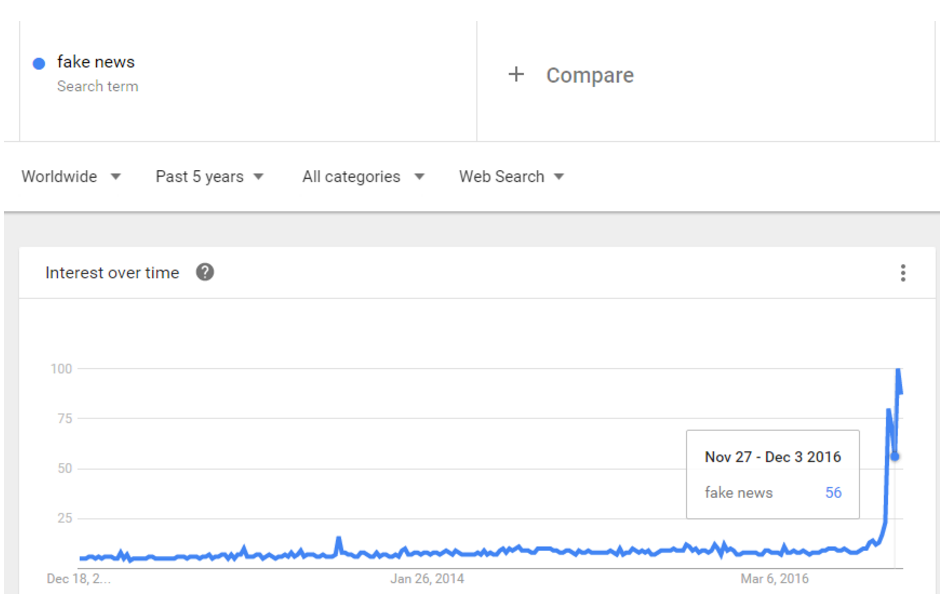
In the past, Google made us familiar with “In the News” section where, as the name states, there were presented the main news from different regions of the world, news coming only from news sites reviewed and approved by Google. Moreover, Google’s search results sometimes included a “News for” box in its search results, like in the example below.
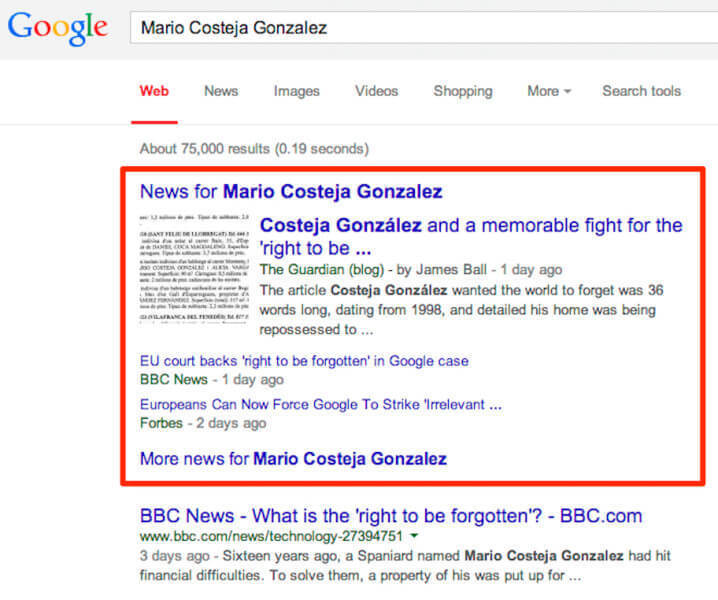
Source: http://searchengineland.com/googles-news-listings-beyond-traditional-205213
Yet, in October 2014, due to Google’s desire to have a more diverse range of voices, “In the News” category suffered some severe changes. Besides the traditional sources, Google started listing stories from Reddit and blogs. Nothing wrong with that, you might say at a first sight. Yet, judging by the screenshots presented below, one might change their mind about the relevancy of the data presented on “In the News” category. It’s not only that the results are surprising; we get absolutely surprising results every day from renowned publications. Yet there are news appearing twice coming from the same source or news including the “F” word.
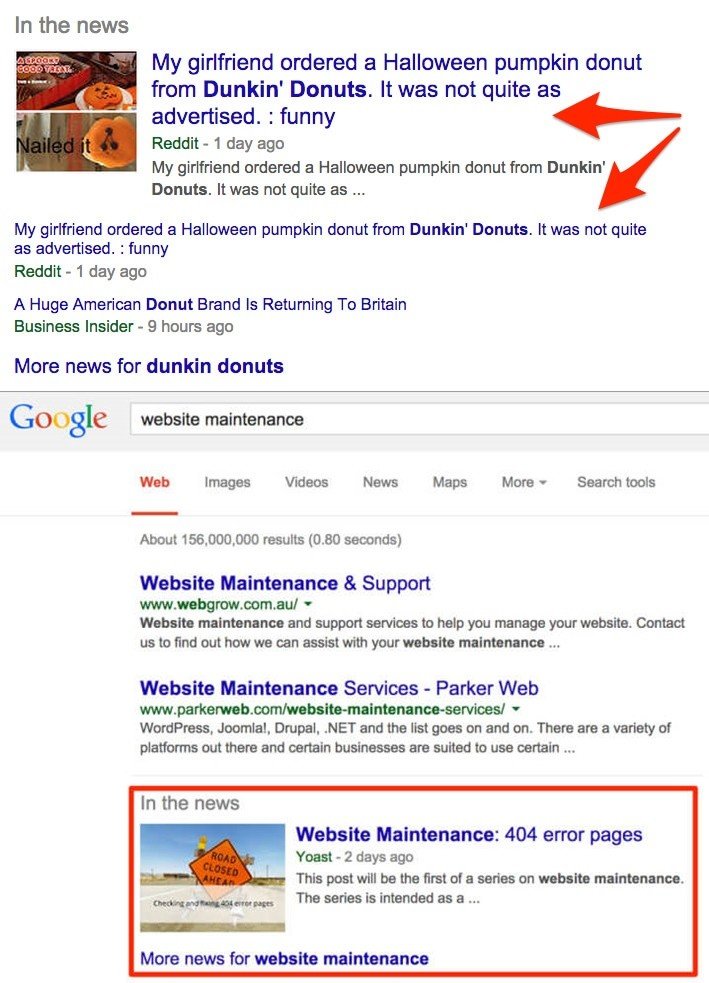
Source; http://searchengineland.com/googles-news-listings-beyond-traditional-205213
We do not know for sure whether out of these considerations only or coroborated with the fake news issue we are going to discuss in the next chapter, Google rebranded its “In the news” section into “Top Stories” (which sounds devoid of the authenticity responsibility). Yet, Google claimed that this change was purely made due to design considerations to make the news box on desktop match that on the mobile version. As you can see in the screenshot below or already may have noticed from your own SERP, this is how “top stories” looks like now.
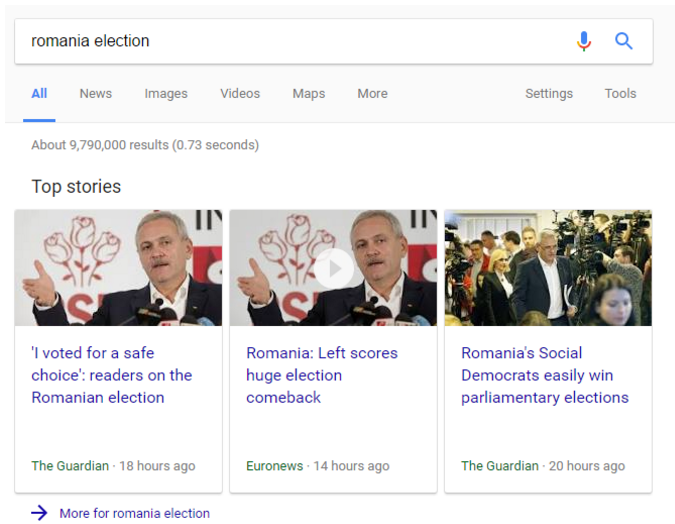
Fake News Appearing in Google
You might have overheard these days – more than you wanted maybe – the issue with fake news appearing in Google’s “In the News” category (now rebranded Top Stories). Although there is a lot of controversy around this subject, things are quite simple. Or they should be.
On the “In the News” category, a section which we tended to trust as we believe that only vetted, reliable sources should appear, there were listed some highly important fake news.
The most known is probably the one related to the USA final Election count which stated that Donald Trump won both popular and electoral college, a false information easily dismantled by the facts and numbers presented by the US Government.
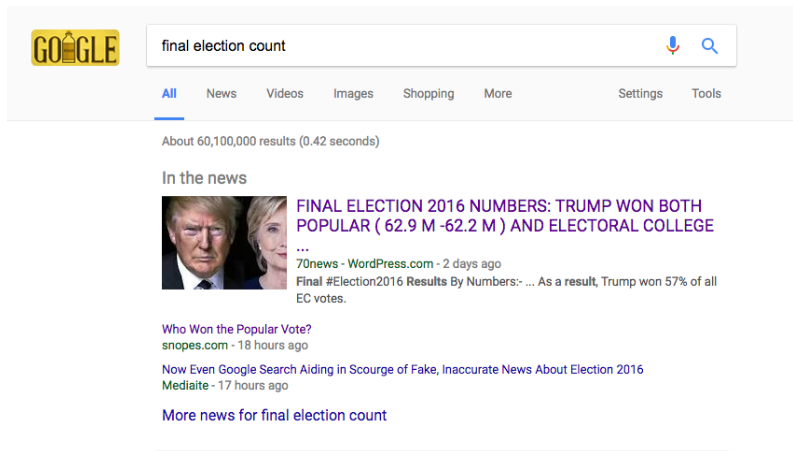
I am far from the position of taking sides; yet, I cannot help myself from wondering if it’s totally Google’s fault for presenting this fake news. Don’t get me wrong; it’s definitely its fault for promoting it top of the page on the “in the news” category.
Yet, if it hadn’t been on that section and we had seen that news elsewhere, would we have figured it out that it was fake news?
Probably not. And what does Google do better if not learning from its users’ behavior? Once again, I am not trying to take sides but only invite you to take a few steps back and remember that Google is a machine that works on algorithms trained (mostly) by its users.
Some interesting news (we like to believe it is true) highlighted the fact that the top 20 fake news stories outperformed real news at the end of the 2016 campaign.
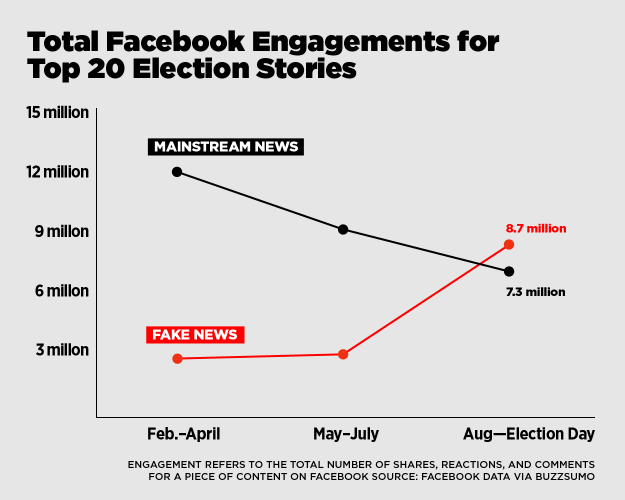
Source: http://www.vox.com/new-money/2016/11/16/13659840/facebook-fake-news-chart
You might say that this is Facebook or Google’s fault and they should solve this matter as soon as possible. And you would be right. This is why we are going to see in the next chapter how Google handled the situation.
We cannot consider ourselves not to blame for the increasing appetite for breaking fabled news and our decreased interest in double checking from several sources when hearing news that might raise some question marks.
Labeling Fact-Check Articles in Google News
As a response to all the controversy, in October this year, Google launched a new feature, fact check, which will add a label next to news stories in search results. As we found out from Google’s blog, rigorous fact checks are now conducted by more than 100 active sites, according to the Duke University Reporter’s Lab, sites such us BBC’s Reality Check. They seem to collectively produce many thousands of fact-checks a year, examining claims around urban legends, politics, health, and the media itself. As you can see in the screenshot below, there is a “fact check” label when presenting stories similar with the one that might interest us.
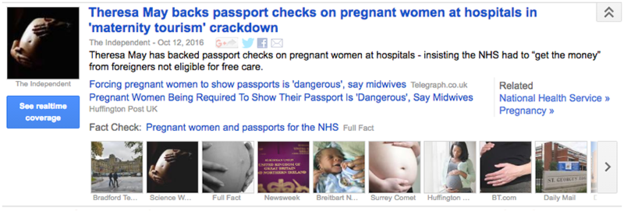
Source: http://www.bbc.com/news/technology-37657524
It seems that a site that wanted to be included in the Google News section went through a lower-level algorithmic check rather than the algorithm for Google Search. This means that it was easier to add fake news into the “in the news” section than adding spam content directly in the search results. This was probably another reason why this “fact-check” label was needed.
Even so, Google’s search results are not editorially vetted.
However, Google’s algorithms do a good job at sniffing out fake as Google is clearly set up to catch “spam.” But however we would look at things, Google’s algorithms will likely never be 100% perfect at telling which information on a website is accurate and which is not. One thing that we must keep in mind is that Google is really trying to wipe fake news from its platform and adding the fact check label could be a fix for that. As Google’s CEO, Sundar Pichai declared:
From [Google’s] perspective, there should just be no situation where fake news gets distributed, so we are all for doing better here.
Will Google Penalize Your Site If You Are Linked from a Fake News Site?
We’ve turned the fake news story up and down so far. But, as we find it hard not to think things from an SEO point of view, this question keeps on popping out:
- What about the backlinks coming from fake news sites?
- Can they get a site owner into trouble?
- Can a site owner get a Google Penalty due to those links?
I know you might prefer a yes or no type of answer, yet, fortunately or not there are only few things in life where things are black and white. Most of them come in grey. And this is the case for links coming from fake news sites as well.
When we talk about Penalties, the Google Quality Guidelines automatically pop out in our mind. Or it should. And this happens because link related issues, including link schemes, are the ones that get us into trouble, as you can see in the screenshot below.
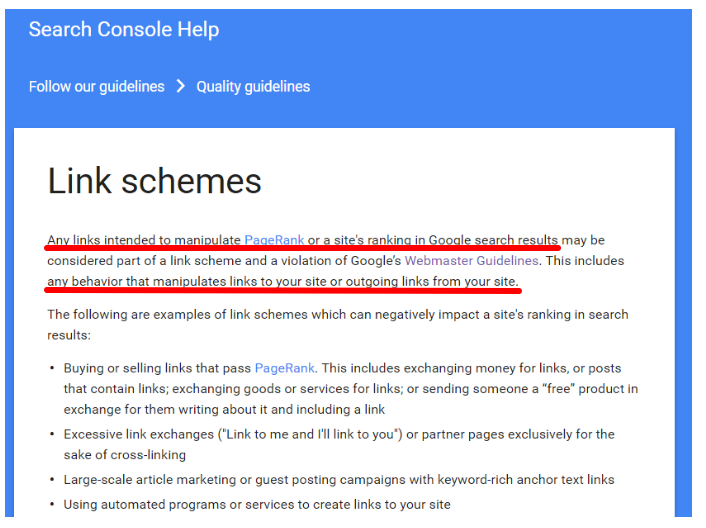
Yet, trying to define a link scheme might sometimes be hard and not very conclusive.
So let’s assume that a fake news website links to you.
- Will your site get penalized by Google?
- It depends.
- On what?
Let’s see; is your backlink profile entirely made up of links from fake or untrustworthy sites? Then yes, I think it’s fair to say you might have a problem.
Do you have only one or a couple of links coming from false news websites? In this case I might be tempted to say that you are on the safe side.
If Google determines that a certain website promotes false news or is untrustworthy it does not necessarily mean that this will affect you (except the part where your entire site’s backlink profile is built on such websites). The truth is that false news websites are doing a really good job in disguising themselves into trustful sources. Therefore, it might happen for anyone to be happy when receiving a link from a news source, honestly believing that is a good domain that linked to them. Take a look at the website below. It looks like a legitimate news site, not a fake one, right?
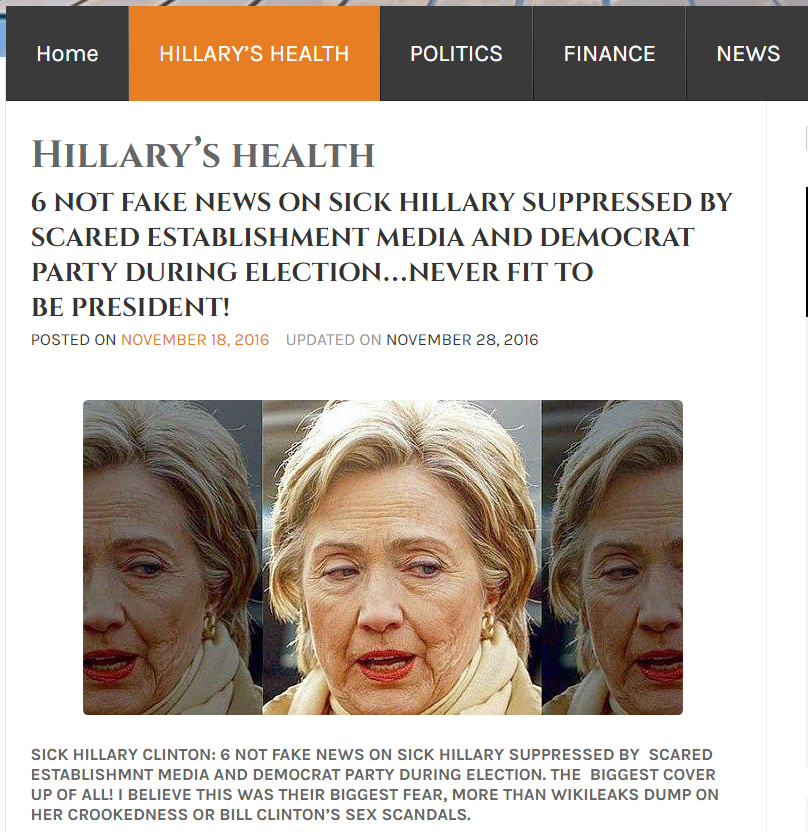
The irony is that being on the top of the trends these days, false news website can even do you some good. The fake sites are earning a lot of media attention right now and they are being linked a lot; therefore, having a connection with them might bring some link equity to you as well. I hope you won’t understand from this matter that it is OK to be linked from fake news websites. We are only trying to highlight the effects that these sort of links might have on your website.
To sum up, before starting a massive disavowing or link removal procedure on all links coming from news sites just because you might consider them false, we advise you to think things through and carefully look at all the sides of the coin.
Should I Ask a Fake News Site to Delete My Links from Their Site?
As stated above, before sending link removal requests and disavowing links you should think contextually. Is my backlink profile invaded with links coming from fake news site? Then yes; a removal or disavowing process might be necessary.
Yet, if this is not the case and you have only a few links coming from such sites, you might still be worried about your situation. And to give you a short answer to appease your worries, we consider that, if they come in small quantities and they are out of control, asking fake news sites to delete your links is not necessarily a must. And here is why:
Given the fact there are so many fake news sites that look “natural” and are designed with great skill, it’s understandable why someone could be fooled into thinking they are reading a factual news story rather than a made-up story.
It’s also understandable why a fake news site can contain links to other completely legitimate sites, like yours.
And we are far from trying to find you excuses if you are in the situation of having links coming from such sites. But sometimes it seems very hard for a human curator to distinguish from a false news site and a real one, let alone an algorithm.
There are situations where highly reputable sites are linked from fake news sites. As you can see below.
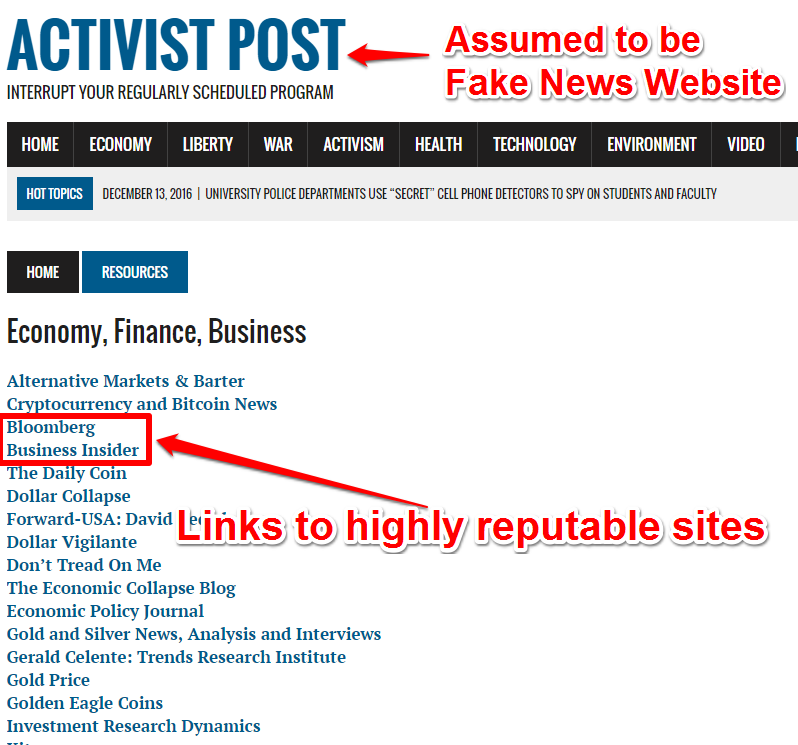
Will Google Deindex/Penalize Fake News Sites?
Google is trying its best to wipe out the fake news from the top stories category and its search results as well. And if you think this is a measure with which Google is limiting the first amendment’s freedom of speech, I invite you to read our final chapter Fake News versus Relative Truth.
As mentioned above, Google is adding a “fact check” label for more accurate and trustworthy results.
Google is not explicitly labeling a site as being a “fake news” website.
Also, it’s very hard for Google to determine the intent or reasoning behind a fake news site. And, as good as Google might be regarding spam, it’s not very good at catching nuances. For instance, you can see below how the search results for the final election keyword looked like at the end of November, a month after Google installed the “fact check” label.
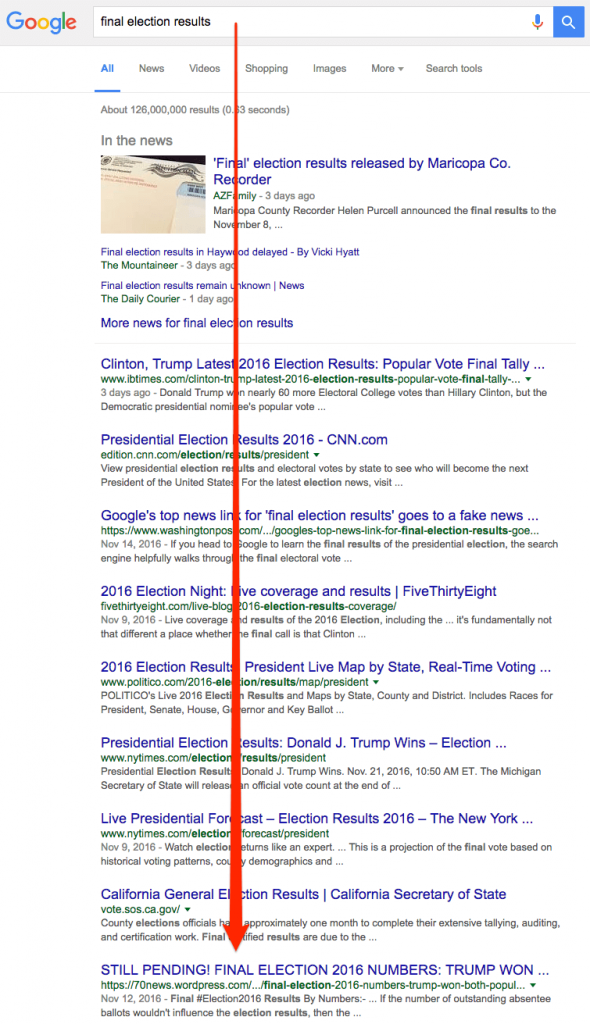
Source: http://marketingland.com/google-might-not-able-stop-fake-news-198755
Indeed, the fake news site that stirred all the controversy remained on the first page of results. It’s true that it is not on the top of the page and it’s also moved to the second page of results for searches on “final vote” or “final election count.” Yet, it was still there.
Google has a real challenge in figuring out whether something is actually true or not as it can also be misled by those who accidentally or deliberately post material that seems to be true but is not.
Yet, as much as Google might want, for the moment, we tend to believe that it is very hard to get fake news penalized. As mentioned before, such penalties would be difficult to be applied by a human, let alone a limited algorithm.
Will Google Show Only Vetted Sites in the News Category?
With the introduction of the fact checked label and the latest changes, we believe that this is what Google is trying to do: to have only vetted sites appearing in the “top stories” box.
It’s hard to believe that this will be an efficient method of stopping fake news from appearing.
Automatically assessing whether something is actually true or not is still a goal far to achieve.
Conclusion: Fake News versus Opinions and Relative Truth
There is another highly debated issue when it comes to categorize news as fake and that is the relativity of truth. With the risk of boring you, allow me to shortly present this matter.
Usually, when someone says that truth is relative, what they are actually saying is that there is no absolute truth.
What does this mean? That some things may appear true to me but not true to you. The concept of “relative truth” might sound tolerant and open-minded but upon closer analysis, it is not quite like that. I like to believe that no sane person says, “Gravity works for you only, but not for me as I do not believe in it,” and proceeds to jump off tall buildings believing no harm will follow.
Certainly, there are some statements that are relative. For example, “Canada has the coolest hockey team in the history ” is a relative statement. I bet a US hockey fan might think differently but even other people not in the matter might think differently as we do not have an absolute standard by which to measure “coolness.” However, the statement “the Canadian ice hockey team won the gold medal at the Sochi 2014 Olympics game” is not relative. It is either true or false, based on objective reality.
To sum up, what we are trying to highlight is the fact that generally speaking, opinions are relative. But when it comes to news that present observable and measurable facts, there is no place for relativity or finding excuses for the fake news existence. These are not opinionated editorials we are talking about but actual factual news that we all (hopefully) want to get rid of.

 Site Explorer
Site Explorer Keyword tool
Keyword tool Google Algorithm Changes
Google Algorithm Changes

Leave a Reply!